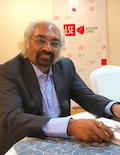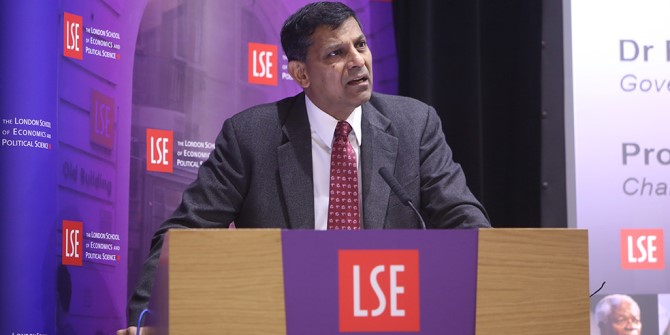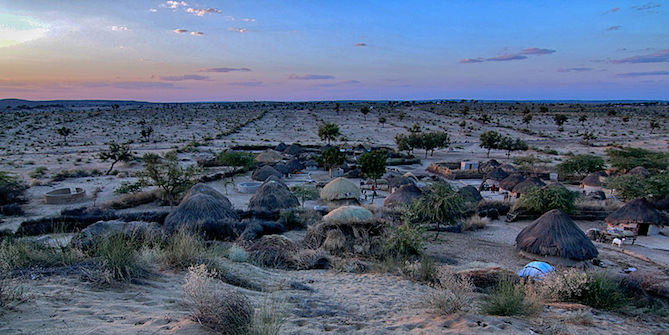 On 29 January 2016, Sam Pitroda spoke on global finance at the first LSE India Summit. After the panel he spoke to Mukti Jain Campion about how technology has transformed the way in which we operate, and his vision for a new world economic order.
On 29 January 2016, Sam Pitroda spoke on global finance at the first LSE India Summit. After the panel he spoke to Mukti Jain Campion about how technology has transformed the way in which we operate, and his vision for a new world economic order.
MJC: What do you think are the three main issues regarding global finance in relation to India?
SP: First of all, global financing has to be seen in light of what’s going on in the world. If you look at global financing in a traditional way, the answers are very different. You look to foreign investments, World Bank, IMF, this ratio, that ratio. But if you look with a broader horizon you realise that the world is going through some very complex changes, mainly because of technology.
Information and Communications Technology has changed everything. The internet, openness, accessibility, connectivity, networking, decentralisation, and the democratisation of information. It also changes business models, delivery systems, products, services. For example, today Uber, the biggest taxi company in the world, doesn’t own taxis. Airbnb, the biggest company in the world for accommodation, does not own any real estate. You have Netflix – biggest movie distributor in the world – doesn’t own any movies. These are multibillion-dollar enterprises, but in a traditional system you cannot value them. So when you put all the numbers together they don’t make sense.
In a sense we need new economics, the old economics doesn’t serve the needs of the information society. The old economics was designed after World War II as part of the US plan to respond to the reality of World War II. The UN, NATO, World Bank, IMF were created. But a lot of things have happened since then, first Gandhi led deconolonisation, which brought almost a billion people with new aspirations into the world economy. Then comes Chinese modernisation, which says, “we’re going to challenge the American idea of democracy and capitalism going hand-in-hand. We’re going to have capitalist society under a communist government”. This succeeded. Then comes Gorbachev, he says “I’m going to do exactly the opposite”, and he didn’t succeed. The Berlin Wall fell, the Soviet Union disintegrated and all that. The United States of America is now the only superpower. They got to lead the world, because they had the design. Then comes 9/11, which changes everything again.
Simultaneously to all this, the technology has been evolving. In 1947 the transistor was invented, radio became portable, television, computers, software, fibreoptics, cell phones, internet. All of that brought the world together, we are really and truly the global village now. For example, I didn’t predict that in the 1990s that India will have a billion cell phones by 2015. We were all experts but we had no idea. So today India is a country of a connected billion. When I started my work in India, we had 2 million phones – landlines – for 750 million people. It used to take 10 years to get a telephone connection. Yet in a short span of 20-25 years we have 1 billion phones.
And many of those will be smartphones very soon.
Absolutely. So when you achieve this connectivity, how do you change the world with it? So technology – and not just IT but biotech, nanotech, materials, alternate energy – is changing everything. But our finance design is still the same, we are still being measured based on GDP, GNP, per capita income etc. I remember in the late 80s I had an argument with somebody from the US, who said, “look, India is broke”, because India only had $1 billion of foreign exchange reserve. I listened for a while, and as a layman who didn’t understand economics I said, “what happens if I sell my Taj Mahal? It’s not in your books. What happens if I sell part of Madurai Temple? Do you know how much gold with have in India? So don’t judge me based on your measurement.” I think that’s what I am challenging today.
What is your vision for the new world economic order?
I think the new world economic order will have to really focus on five new things. Today the world order is structured aroud democracy, capitalism, human rights, consumption and violence.
So what’s your new five?
Firstly, democracy must be inclusion, if you don’t include everybody it’s not a democracy. If you are hijacked it doesn’t work for everybody.
Are you thinking of India in this example?
Everywhere – even in the US, democracy is not inclusive. Look at what happened in Paris, you go see where Arabs live and you yourself can see the difference in standards of living. You have not integrated them into the mainstream. African Americans are not included in the mainstream, Latinos are not included in the mainstream, and so you’ll have problems! We haven’t included our low caste people or tribal people in the mainstream. So all over the world there is a crisis of inclusion.
Second, you cannot have a market-driven economy, today you need an environment-driven economy, because the market-driven economy has messed up the environment.
Third, I want to shift focus from human rights to human needs. I may have human rights but if I don’t have food, I don’t have shelter – what good is my human rights? So don’t tell me I have human rights, give me human needs as well. I don’t mean you should donate them to me. Include me in your systems, then I can do it myself. Today you have isolated me.
Fourth, I would really like to change the equation on consumption, to conservation. And finally, violence to non-violence. If you have these five new parameters to design the world, it would mean a lot in terms of new policies, new strategies, new approaches, all of that.
So what’s going to lead that change?
I want to start a new conversation. I have laid out a plan. Not that it’s a perfect plan but I want people to say, “hey, this doesn’t work”, fine – tell me how it works, teach me. I’m saying we need to restructure all the institutions, we need to build new institutions: in the last seventy years we have hardly built any new global institutions. How is it possible that in the 21st century we haven’t built any new global institutions? I want global patents, a global constitution.
Paris climate talks were a significant step towards that.
True, in recent history we had an agreement, everybody was able to come to a table and agree on something, so that gives hope that we can have the next global constitution.
We need certain things local, and certain things global. Technology’s going to break big companies, and you will see small enterprises, local enterprises instead. We had economy of scale, then we moved to economy of scope, now we need to move to economy of preference. Everything would be made locally – my clothes don’t need to come from China, it could come locally, I could start wearing Khadi, I could start wearing silk, I could have local cotton. My vegetables could be local, but my Apple computer could be international.
Tell me about your book.
I just finished writing a book on my life, called Dreaming Big which was published by Penguin here [in India], and is available on Amazon all over the world. I’m now writing a book called Redesign the World.
So some of these ideas we’ve discussed will be in there?
Absolutely. I’m hoping that I will finish in six months. But definitely by end of 2016.
This post is an edited transcript of a recorded interview. Listen to the full podcast here.
Cover image credit: Sonali Campion
Note: This article gives the views of the author, and not the position of the South Asia @ LSE blog, nor of the London School of Economics. Please read our comments policy before posting.
About the Authors
Sam Pitroda is a telecom inventor, entrepreneur, development thinker and policy maker.
Mukti Jain Campion is a radio producer and Founder of Culture Wise, an independent company which produces documentaries for BBC Radio.







